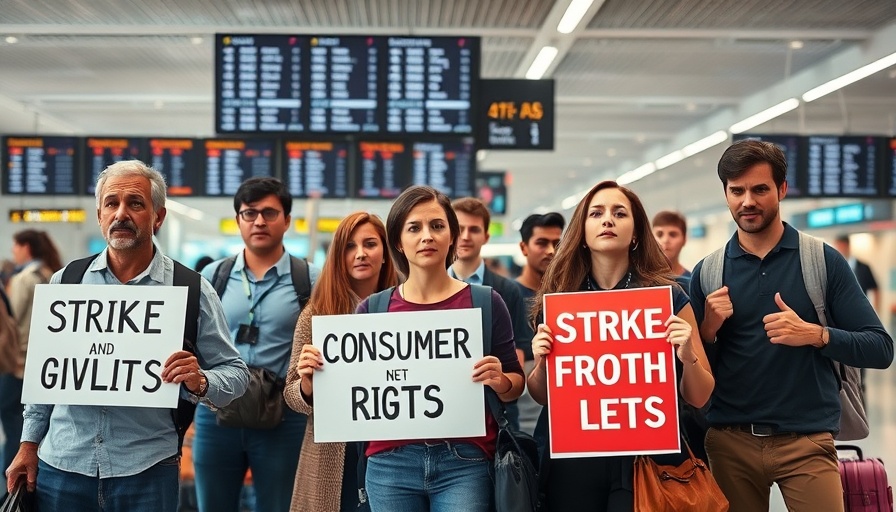
Air Canada Strike: A Lesson in Travel Disruption and Consumer Rights
The recent Air Canada strike has left many passengers stranded, frustrated, and scrambling for solutions as they cope with massive flight cancellations. Over the past weekend, thousands found themselves either stuck at airports or forced to abandon their travel plans altogether. With airlines facing increased scrutiny over their operational practices, these events highlight the critical intersection of labor disputes and consumer rights.
Understanding the Impact of Labor Strikes on Travelers
Labor strikes have long been a tool for workers to advocate for better working conditions and pay. However, the immediate fallout from such actions can leave unsuspecting travelers in chaotic scenarios. This latest strike, stemming from contract disputes involving flight attendants and ground staff, reflects a broader trend seen in various sectors where labor disputes have disrupted normal services.
- In the past year, similar situations have arisen in several industries, especially during peak travel seasons.
- For example, the recent United States rail strike caused significant disruptions, leading to a ripple effect across the transportation sector.
- Travelers must stay informed about their rights during these disruptions, from receiving refunds to rebooking flights.
The Emotional Toll on Passengers
Emotions ran high among passengers affected by the Air Canada strike. Many expressed feelings of anger and helplessness as they navigated a maze of customer service lines only to be met with frustration and limited assistance. Families separated due to cancellations are left questioning their travel plans, and business travelers find themselves in precarious situations that could cost them opportunities.
Critical voices within the impacted community, including frequent flyers and travel bloggers, shared their experiences on social media, further amplifying the urgency of resolving such labor disputes expediently. Acts of solidarity among travelers have highlighted how interconnected the travel community is — one passenger’s plight often echoed by many others. This reflects a growing awareness about shared struggles when travel disruptions occur.
Consumer Rights and What Passengers Should Know
With the backdrop of the Air Canada strike, it’s essential for passengers to be well-informed about their rights during such disruptions. Under Canadian law, airlines are obligated to provide timely notices of cancellations and delays, as well as support during significant disruptions. Passengers should be aware of their entitlements, including:
- Compensation for delays over three hours
- Meal vouchers during extended wait times
- Accommodation for overnight delays
Knowing these rights empowers consumers to demand the treatment they deserve. Advocacy groups and consumer protection agencies are urging affected travelers to seek compensation when warranted, highlighting that airlines must adhere to regulatory guidelines.
Future Considerations: How Airlines Might React to Consumer Pressures
As airlines face increasing scrutiny from both the public and regulators, we may see a shift in policies related to how airlines manage labor disputes. Enhanced communication protocols during strikes, more robust support for travelers, and clear pathways for compensation claims may become standard practice as companies realize that transparency can curb negative brand perception.
Ultimately, the experiences from this incident will likely reshape how airlines handle their operational strategies during labor disputes in future, merging ethical considerations with commercial viability. As consumers become more aware of their rights and the implications of labor strikes, airlines will need to prioritize customer service amidst challenging circumstances.
What This Means for the Travel Industry and Travelers
The Air Canada strike is a powerful reminder of the potential for disruption in the travel industry, raising questions about consumer advocacy in an increasingly complex world. As we move forward, it is crucial for both travelers and industry stakeholders to engage in conversations about maintaining fair practices while ensuring that consumer rights are respected. Passengers should continue sharing their experiences to foster collective action when needed. As travel resumes a semblance of normalcy, heightened awareness and proactive engagement are essential for navigating the complexities of air travel.
This situation underscores the need for both sides — airlines and labor unions — to work towards equitable solutions that prevent future disruptions while safeguarding the rights of consumers. The balance between worker rights and consumer experiences will shape the evolution of the travel industry.
As this situation evolves, travelers are encouraged to stay updated and informed, not only for their personal use but as part of a larger movement towards accountability and fairness in the travel industry.
 Add Row
Add Row 
 Add
Add 


Write A Comment